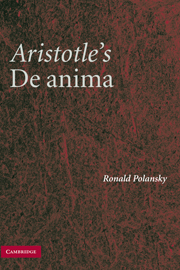Book contents
- Frontmatter
- Contents
- Preface
- List of Abbreviations
- Introduction
- COMMENTARY ON DE ANIMA: : Book 1
- 1 The Nobility and Difficulty of Study of Soul; Its Connection with Body
- 2 The Predecessors' Use of Soul to Account for Motion and Perception
- 3 Criticism of Predecessors' Way of Accounting for Motion
- 4 Criticism of the Harmonia View as an Account of Motion
- 5 Criticism of Predecessors' Way of Accounting for Cognition
- COMMENTARY ON DE ANIMA: Book 2
- COMMENTARY ON DE ANIMA: Book 3
- Bibliography
- Index
2 - The Predecessors' Use of Soul to Account for Motion and Perception
Published online by Cambridge University Press: 18 December 2009
- Frontmatter
- Contents
- Preface
- List of Abbreviations
- Introduction
- COMMENTARY ON DE ANIMA: : Book 1
- 1 The Nobility and Difficulty of Study of Soul; Its Connection with Body
- 2 The Predecessors' Use of Soul to Account for Motion and Perception
- 3 Criticism of Predecessors' Way of Accounting for Motion
- 4 Criticism of the Harmonia View as an Account of Motion
- 5 Criticism of Predecessors' Way of Accounting for Cognition
- COMMENTARY ON DE ANIMA: Book 2
- COMMENTARY ON DE ANIMA: Book 3
- Bibliography
- Index
Summary
The first chapter laid out the perplexities or aporiai confronting the effort to provide accounts of soul and its attributes, perplexities resulting from endoxa that draw thought in opposed directions. Much of this reflection was methodological. A connected task for the beginning of an Aristotelian science is to review the substantive positions of predecessors. Here the endoxa are not as in chapter 1 general ones about what an account of soul and its attributes should be like, but the concrete accounts the predecessors give of the soul and its attributes. This further eliciting of endoxa continues the project of dialectic. The predecessors in their general notions and concrete accounts of soul raise perplexities and may offer ways to resolve them. In 403b20–22 Aristotle says that in order to be well provided (εὐπορεῖν) we are to go through the perplexities simultaneously (ἅμα διαποροῦντας) with the opinions (δόξας) of predecessors, that is, their views and difficulties to which they give rise. We may embrace (λάβωμεν) what the predecessors have said well but be on our guard against (εὐλαβηθῶμεν) whatever they have not said well (b23–24).
By speaking of his predecessors' doctrines along with their reasons for proposing them, Aristotle delves deeply into principles. As usual in his treatments of predecessors, he carefully orchestrates his approach so that he has profound preparation for elaborating his own positions that alleviate the perplexities.
- Type
- Chapter
- Information
- Aristotle's De AnimaA Critical Commentary, pp. 62 - 82Publisher: Cambridge University PressPrint publication year: 2007



